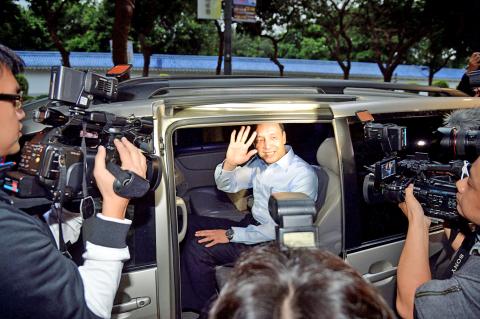Chinese Nationalist Party (KMT) Chairman Eric Chu (朱立倫) and Secretary-General Lee Shu-chuan (李四川) yesterday were called in for questioning by the Special Investigation Division (SID) of the Supreme Prosecutors’ Office over the replacement of Deputy Legislative Speaker Hung Hsiu-chu (洪秀柱) as the KMT’s presidential candidate.
Hung was also interviewed, but separately from Chu and Lee.
The division launched an investigation after two opposition lawmakers filed lawsuits over Hung’s ouster from the presidential race.

Photo: CNA
Chu and Lee left the SID’s office in Taipei after about two hours, and were greeted by a throng of reporters.
The accusations were “groundless, and had no basis in fact,” Chu told reporters, adding that the entire process had been handled “in an open and transparent manner” at the expedient KMT party congress on Saturday last week.
The procedures had been clearly explained to the public, he said, adding that the Democratic Progressive Party (DPP) was “abusing the resources of the judicial system” by filing the accusations and asking the SID to initiate an investigation.
“These politicians used this ploy to interfere in the election. I very much disagree with their actions. They are causing a lot of damage to Taiwan’s democracy,” Chu said.
“However, I will face all the accusations and rumor-mongering with courage. I believe all voters can see that this is not the proper way to deal with a political party’s chairman and a nominee as candidate for the presidential election, he said.”
DPP Legislator Chen Ting-fei (陳亭妃) filed suit against Chu and Lee on Oct. 7, followed by Taiwan Solidarity Union (TSU) Legislator Chou Ni-an (周倪安), who filed a similar complaint.
The SID said it decided to combine the two lawsuits into one case for the purposes of investigation, with prosecutor Ko Yi-fen (柯宜汾) appointed to handle the case.
Chou and Chen accused Chu and Lee of “so inn a teng” (搓圓仔湯), a commonly used Hoklo (also known as Taiwanese) term that means “kneading to make rice ball soup.”
When used in a political context, the term means schemes involving coaxing a candidate to drop out of a race by offering money, a government position or other enticements.
However, such actions are a violation of Article 84 of the Presidential and Vice Presidential Election and Recall Act (總統副總統選舉罷免法), which stipulates that “anyone who asks for an expected promise or asks a candidate or a person having the qualification of candidate to abandon the campaign or conduct certain actions on by offering bribes or other undue benefits” is punishable by law.

A Ministry of Foreign Affairs official yesterday said that a delegation that visited China for an APEC meeting did not receive any kind of treatment that downgraded Taiwan’s sovereignty. Department of International Organizations Director-General Jonathan Sun (孫儉元) said that he and a group of ministry officials visited Shenzhen, China, to attend the APEC Informal Senior Officials’ Meeting last month. The trip went “smoothly and safely” for all Taiwanese delegates, as the Chinese side arranged the trip in accordance with long-standing practices, Sun said at the ministry’s weekly briefing. The Taiwanese group did not encounter any political suppression, he said. Sun made the remarks when

The Taiwanese passport ranked 33rd in a global listing of passports by convenience this month, rising three places from last month’s ranking, but matching its position in January last year. The Henley Passport Index, an international ranking of passports by the number of designations its holder can travel to without a visa, showed that the Taiwan passport enables holders to travel to 139 countries and territories without a visa. Singapore’s passport was ranked the most powerful with visa-free access to 192 destinations out of 227, according to the index published on Tuesday by UK-based migration investment consultancy firm Henley and Partners. Japan’s and

BROAD AGREEMENT: The two are nearing a trade deal to reduce Taiwan’s tariff to 15% and a commitment for TSMC to build five more fabs, a ‘New York Times’ report said Taiwan and the US have reached a broad consensus on a trade deal, the Executive Yuan’s Office of Trade Negotiations said yesterday, after a report said that Washington is set to reduce Taiwan’s tariff rate to 15 percent. The New York Times on Monday reported that the two nations are nearing a trade deal to reduce Taiwan’s tariff rate to 15 percent and commit Taiwan Semiconductor Manufacturing Co (TSMC, 台積電) to building at least five more facilities in the US. “The agreement, which has been under negotiation for months, is being legally scrubbed and could be announced this month,” the paper said,

MIXED SOURCING: While Taiwan is expanding domestic production, it also sources munitions overseas, as some, like M855 rounds, are cheaper than locally made ones Taiwan and the US plan to jointly produce 155mm artillery shells, as the munition is in high demand due to the Ukraine-Russia war and should be useful in Taiwan’s self-defense, Armaments Bureau Director-General Lieutenant General Lin Wen-hsiang (林文祥) told lawmakers in Taipei yesterday. Lin was responding to questions about Taiwan’s partnership with allies in producing munitions at a meeting of the legislature’s Foreign Affairs and National Defense Committee. Given the intense demand for 155mm artillery shells in Ukraine’s defense against the Russian invasion, and in light of Taiwan’s own defensive needs, Taipei and Washington plan to jointly produce 155mm shells, said Lin,